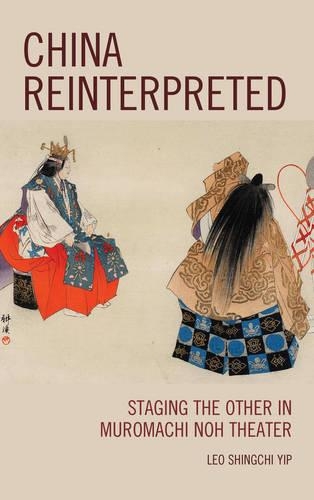
China Reinterpreted: Staging the Other in Muromachi Noh Theater
(Hardback)
Publishing Details
China Reinterpreted: Staging the Other in Muromachi Noh Theater
By (Author) Leo Shingchi Yip
Bloomsbury Publishing PLC
Lexington Books
4th April 2016
United States
Classifications
Professional and Scholarly
Non Fiction
792.0952
Physical Properties
Hardback
230
Width 159mm, Height 238mm, Spine 23mm
513g
Description
China Reinterpreted is the first comprehensive study on the representation of Chinese figures and motifs in Muromachi Japanese noh theater. Given that China had a strong influence on Japanese culture from the sixth to the early seventeenth centuries, research on Japanese reception of Chinese culture abounds. This book examines how noh theater integrated earlier reception of Chinese culture in various disciplines to produce its reinterpretation of China and Chinese culture on stage. Centering on a group of noh plays that features Chinese characters and motifs, China Reinterpreted explores not only the different means and methods of adaptation, but also the intricate (re)construction of diverse and complex images of China. This study situates the selected Chinese plays in the context of the dramaturgy and artistic conventions of noh, as well as the sociopolitical stances and artistic preferences of the audiences, and thus highlights the aesthetics, cultural, and sociopolitical agendas of noh theater of the time. By analyzing the various images of China (Japans cultural Other) staged in Muromachi noh theater, China Reinterpreted offers a case study of the representation of the Other in an intra-Asia context.
Reviews
This book is an excellent introduction to premodern Chinese and Japanese cultural exchanges and communication. Comparative readings of the Noh plays present the unique trajectory by which each Chinese character arrives at the Japanese Noh stage. The translation of the Noh play Ykihi provides a good example of a Chinese play. For scholars, teachers and students who are interested in Sino-Japanese cultural transmission, as well as the development of Noh theater in the medieval period, this book will be a good reference. * Japanese Studies *
China Reinterpreted is the first comprehensive scholarship on how Japanese n theatre responded, incorporated, used, re-interpreted, and represented Chinese themes and characters during the late medieval Muromachi period. . . . China Reinterpreted is carefully reasoned and extensively researched. It is essential reading for anyone interested in the study of medieval Japanese n theatre, and especially Chinese plays in crosscultural contexts. Furthermore, the potential applications of Yips theoretical framework are far-reaching, and as such may greatly contribute to a broader range of scholarship from transnational and intra-Asia studies, to art history, music, theatre and dance. * Asian Theatre Journal *
This is an extremely well-informed and scholarly work, full of valuable information about important plays that in many cases have not been considered in depth in English hitherto. China Reinterpreted is a welcome and valuable contribution to contemporary scholarship about N. * Comparative Literature Studies *
By looking closely at eleven noh plays that feature Chinese stories and characters, Professor Yip has written a carefully-documented book about the multiple ways in which Japanese playwrights portrayed China, Japans primary Muromachi Period 'other'these 'others' are divided into 'sympathized other,' 'distanced other,' 'exotic other,' 'destructive other,' and 'harmonious other,' representing the ambivalence that educated Japanese felt toward China in the latemedieval period of Japans history. -- Mae Smethurst, Professor Emerita, University of Pittsburgh
In China Reinterpreted: Staging the Other in Muromachi Noh Theater, the author does a wonderful job in analyzing the images of China manifested in the Chinese plays of noh using various theories of Self and Other. This is a very informative scholarly book not only for the study of noh theater but also of Asian theater and culture in general. -- Noriko Reider, Miami University
Author Bio
Leo Shingchi Yip is associate professor of Japanese studies at Gettysburg College.
